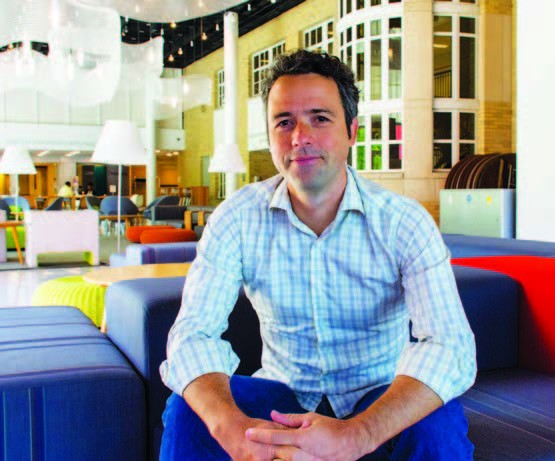Ary Bobrow ’99 leverages holistic view to strive for global change

For Ary Bobrow ’99, director of the United Nations Office of Project Services in Anglophone West Africa – a portfolio that covers Gambia, Ghana, Liberia, Nigeria and Sierra Leone – his motivation has always been giving everyone an equal opportunity.
After graduating from the College of Human Ecology with a major in human service studies, Bobrow, who grew up in Ithaca, traveled to Guatemala where he was involved in a community development project supporting vocational training, education and basic health services.
Returning to the U.S., he completed a master’s degree in social work at Syracuse University and soon began
his career with the United Nations, working at the Office for Project Services (UNOPS), where he became a director and established a new hub covering Anglophone West Africa with a
specific focus on health infrastructure and renewable energy.
“We’re an implementing arm of the United Nations focused on infrastructure, procurement and project management,” he said. “We implement about $1.5 billion worth of projects each year, partnering with governments around the world to deliver services to people in need.”
During the 2014-16 Ebola crisis in West Africa, many health clinics were closed down, hospital staff did not have the resources they needed and patients could not be isolated fast enough, risking exposure to entire health facilities.
Bobrow was tasked with coordinating the UNOPS response and was responsible for upgrading health centers with triage and isolation wards across Sierra Leone, Liberia and Guinea.
“We had to find a solution to better support patients, protect hospital staff and slow the spread of infectious disease – with a very limited budget in some of the most difficult-to-reach areas of the countries,” he explained. “We worked very closely with the ministries of health, the World Bank and other development partners to design resilient infrastructure that met global best practices, were functional for local staff and were within budget.”
This entailed helping design, plan and implement the building of permanent structures around medical facilities, fencing the compound to control access to the hospitals, and providing basic isolation [areas] so medical staff could test patients without risk of exposing other patients to the infectious virus.
Further, Bobrow worked with the World Health Organization and the World Bank to purchase and deliver medical equipment for hospitals and labs such as medical waste incinerators, ambulances and other items needed to help save lives.
His most recent work is focused on providing off-grid renewable energy to rural communities in Sierra Leone, while at the same time continuing health work in four other countries he supports.
Bobrow believes that if you want to have an impact, you have to look at problems from many perspectives, and that is what he carries with him from his Human Ecology education.
“I had to take courses on economics, survey design, psychology, counseling and evaluation,” he said. “I really came to understand that what matters is what works – to pay attention to what the data tells us but to also recognize that it’s about more than the technical solution.”
“If we had only worked with engineers or architects, I’m convinced we wouldn’t have been able to find effective solutions. … we needed to consult with doctors, epidemiologists, politicians, community leaders, hospital administrators and then to balance the needs, resources and urgency.”
The College of Human Ecology prepared him to bring together various stakeholders while keeping a holistic view in mind, he explained.
As global trends continue to show widening wealth gaps, Bobrow said that if we are going to give people a fair chance to live up to their full potential as human beings, we must step back from using cookie-cutter approaches and focus on co-creating new solutions together.
“The only way forward is to build our future together – finding solutions that work from multiple perspectives and committing to providing a fair chance for everyone,” he said.
“I really came to understand that what matters is what works – to pay attention to what the data tells us but to also recognize that it’s about more than the technical solution.”